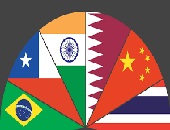Decarb Economics 101
To mitigate the consequences of climate change, the world requires international coordination. In 2015, the Paris Agreement was signed by 195 nations. Its long-term temperature goal is to keep the rise in mean global temperature to well below 2 °C (3.6 °F) above pre-industrial levels, and preferably limit the increase to 1.5 °C (2.7 °F), which would reduce the worst effects of climate change. Many countries are developing policies to get themselves on a path toward achieving the agreed-upon 1.5 °C goal. Although present progress may seem piecemeal, in the words of a Chinese proverb, “A great journey begins with a single step.” The figure below […]
World Energy Outlook
On October 24, 2023, the International Energy Agency (IEA) released its annual report, World Energy Outlook (WEO), to an international audience. The agency states that the energy world “remains fragile but has effective ways to improve energy security and tackle emissions.” Agency analysts looked at how close the countries of the world are to meeting the objectives of the Net Zero Emissions by 2050 (NZE) Scenario, which limits global warming to 1.5 °C, a goal signed by many countries and often referred to as the Paris Agreement. [As of March 2021, 194 states and the European Union have signed the […]
The Greenium
Does the average household want to invest in climate-friendly assets? If so, what proportion of assets are earmarked for green investments? What kinds of assets (equity or fixed income) are preferred? “Green investments are popular, but only about one-third of German households have some kind of green account,” said Monika Piazzesi, Professor of Economics at Stanford University. She was speaking at a webinar titled “Household Climate Finance: Theory and Survey Data on Safe and Risky Green Assets,” held on September 7, 2023, as part of the Virtual Seminar on Climate Economics sponsored by the Federal Reserve Bank of San Francisco (FRBSF). Her […]
The Meerkat Way
Given that climate change is the biggest economic upheaval of our age, what can risk professionals do? What, exactly, is meant by a “net-zero transition,” and why does each organization need a transition plan to reach it? How should risk professionals get started? On May 23, 2023, the membership of the Global Association of Risk Professionals (GARP) was invited to a one-hour webinar titled “Net-Zero Transition Plans” that promised to answer these questions and more. Tony Rooke, Executive Director and Head of Transition Finance at the Glasgow Financial Alliance for Net Zero (GFANZ), delivered the webinar. GFANZ is a global […]
Carbon Pricing
What is the best way to address climate change? If too much carbon is released in the air, how can emissions be reduced? By regulating corporations or by imposing costs on consumers in the form of a carbon tax? Moreover, even if a solution is found, not all nations, and not all people within nations, will agree on how to tackle the problem. In the words of Professor Barry Rabe, author of Can We Price Carbon? “Compelling ideas from economics do not necessarily suspend the laws of politics.” On May 4, 2023, Jessica Green, professor of political science at University […]
Chemistry and the Economy
Risks are multiplying and becoming more complex. The chemical industry is intrinsically connected to the economy. Can chemistry help solve the biggest crises facing us today? On December 15, 2022, the American Chemical Society hosted a virtual webinar, “Chemistry and the Economy.” The moderator was Bill Carroll, principal of Carroll Applied Science, who spoke to Paul Hodges, chairman of the Swiss-based strategy consulting firm New Normal. In speaking about risks, Hodges does not beat around the bush. He began with what he called “the four horsemen of the apocalypse.” He stated, “First there was the pandemic and associated supply chain […]
E-Growth in Emerging Markets
What is happening in emerging markets? Are there areas where an informed investor can make a profit? What are the pitfalls to avoid? On November 22, 2022, the CFA Society of Toronto hosted a virtual webinar, “Rethinking Emerging Markets: The Case for Growth & How to Capture It.” The speaker was Kevin T. Carter, the founder and Chief Investment Officer of EMQQ Global. Carter began by providing his background. “I pray toward Omaha,” he quipped, because he considers himself an active “value” investor first and foremost, along the lines of “the oracle of Omaha,” Warren Buffett. Carter has collaborated with […]
Inflation & Wage Growth
As the U.S. economy emerges from the pandemic, inflation has been climbing. What effect has this had on average wages? Will it be a long-lasting effect? Recent research by leading economists at the Federal Reserve Bank of San Francisco (FRBSF) dives into these questions. “Our findings show that, since the pandemic, inflation expectations have been playing a more prominent role in wage-setting dynamics than in the past,” say the four authors of a paper released on September 6, 2022. Òscar Jordà is a senior policy advisor, Fernanda Nechio is a vice president, and Celeste Liu and Fabián Rivera-Reyes are both […]
Carbon, Cargo, Covid
As we slide into summer 2022, what are the big factors affecting the markets? Carbon, cargo, Covid. Governments and companies are starting to address the excessive carbon dioxide that is causing climate change. Interruptions of the supply chain, heavily dependent on cargo ships, continue to worsen operational risk. Meanwhile, the global economy is still dealing with the Covid-19 pandemic. On May 2, 2022, Derek Walter, head of the Institutional Asset Management Committee at the CFA Society Toronto, moderated two panelists during a webinar to discuss the underlying drivers of market changes. “We need to separate the short-term from the long-term […]
The New Interventionism
Have you noticed that governments are stepping in more often to regulate things? There appears to be renewed interest in industrial policy. In the words of the magazine The Economist, “governments around the world are becoming bossier to the private sector.” Why is this? What will be the overall effect? On January 20, 2022, Sacha Nauta, executive editor of the Economist, posed questions to her colleagues: Jan Piotrowski, business editor, and Don Weinland, China business and finance editor, in order to explore the rise of state interventionism and its potential consequences. Old versus New “There’s been an increase in the […]










